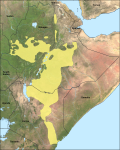A reciprocal pronoun is a pronoun that indicates a reciprocal relationship. A reciprocal pronoun can be used for one of the participants of a reciprocal... 15 KB (1,991 words) - 00:06, 24 March 2024 |
a pronoun is "you", which can be either singular or plural. Sub-types include personal and possessive pronouns, reflexive and reciprocal pronouns, demonstrative... 30 KB (3,311 words) - 13:45, 8 April 2024 |
A reflexive pronoun is a pronoun that refers to another noun or pronoun (its antecedent) within the same sentence. In the English language specifically... 47 KB (4,888 words) - 15:52, 30 April 2024 |
which a reflexive or reciprocal pronoun should find its antecedent. The a-sentences are fine because the reflexive or reciprocal pronoun has its antecedent... 29 KB (3,798 words) - 22:52, 2 March 2024 |
Reciprocal pronoun Reflexive verb Haspelmath, Martin. 2007. Further remarks on reciprocal constructions. In: Nedjalkov, Vladimir P. (ed.) Reciprocal constructions... 2 KB (208 words) - 22:02, 3 March 2023 |
Reflexive verb (section Reciprocal) pronominal verbs are reciprocal (they killed each other), passive (it is told), subjective, and idiomatic. The presence of the reflexive pronoun changes the meaning... 26 KB (2,445 words) - 13:36, 23 March 2024 |
Personal pronouns are pronouns that are associated primarily with a particular grammatical person – first person (as I), second person (as you), or third... 26 KB (3,395 words) - 04:08, 23 January 2024 |
Dagbani language (section Reciprocal Pronouns) occurrence. Emphatic pronouns in Dagbani serve as regular pronouns in that they can stand in isolation, preverbally or postverbally. Reciprocals are formed by... 27 KB (2,623 words) - 14:40, 12 March 2024 |


